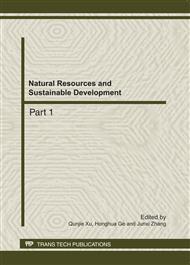[1]
United Nations Our Common Future - Report of the World Commission on Environment and Development', UN Doc. A/42/427 – Annex (4 August 1987), chapter 2, I.
Google Scholar
[2]
Report of the World Commission on Environment and Development (the Brundtland Report), Our Common Future (1987), p.43
Google Scholar
[3]
V. Lowe, Politics of Law-Making, in Byers (ed.), The Role of Law in International Politics (2000), p.213, 216 and 217.
Google Scholar
[4]
Mirjam van Harmelen, Matthijs S. van Leeuwen and Tanja de Vette, International Law of Sustainable Development: Legal Aspects of Environmental Security on the Indonesian Island of Kalimantan, The Hague Brussels, 2005.
Google Scholar
[5]
P. Sands, International Law in the Field of Sustainable Development: Emerging Legal Principles, in W. Lang (ed.), Sustainable Development and International Law (1994), p.56.
Google Scholar
[6]
ILA Committee on Legal Aspects of Sustainable Development (2002).
Google Scholar
[7]
Arts, K. (2000), Integrating Human Rights into Development Cooperation: The case of the Lomé Convention, Kluwer Law International: The Hague. pp.24-26.
Google Scholar
[8]
Antoinette Hildering,International Law, Sustainable Development and Water Management,Eburon Publishers,2004,pp.50-55,41-42.
Google Scholar
[9]
A.E. Boyle and M.R. Anderson (ends), Human Rights Approaches to Environmental Protection, Clarendon Press, 1996, 103.
Google Scholar
[10]
Agenda 21, the U.N. Program of Action from Rio, UN Doc. DPI/1344 (1993).
Google Scholar
[11]
Edith Brown Weiss, The Emerging Structure of International Environmental Law in N.J. Vig and R.S. Axelrod, eds., The Global Environment: Institutions, Law, and Policy Washington: Congressional Quarterly, 1999), p.98.
DOI: 10.4324/9781003421368-7
Google Scholar
[12]
M.A. Hajer, The Politics of Environmental Discourse: Ecological Modernization and the Policy Process, OxFord: Clarendon Press, 1995, pp.97-98.
Google Scholar
[13]
P. Sands, Sustainable Development: Treaty, Custom and the Cross-fertilization of International Law in A. Boyle and D. Freestone, International Laru and Sustainable Development: Past Achievements and Future Challenger (Oxford: Oxford University Press, 1999.
DOI: 10.1093/acprof:oso/9780198298076.003.0003
Google Scholar


